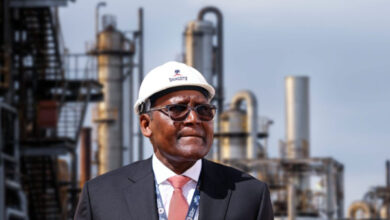Two armies accused of backing DR Congo’s feared rebels

Uganda is backing M23 rebels fighting across its border in the eastern Democratic Republic of Congo, UN experts say, warning that a rapidly escalating crisis “carried the risk of triggering a wider regional conflict”.
The well-armed M23 is often accused of being a Rwandan proxy force, but the UN experts have put forward evidence to suggest that it also has Uganda’s support.
Uganda has denied the allegations in the UN report that also accuses Rwanda of having up to 4,000 troops in DR Congo fighting alongside the rebels.
In response, Rwanda did not deny the allegation and told the BBC the DR Congo government lacked the political will to resolve the crisis in its mineral-rich east, which has witnessed decades of unrest.
The UN experts said that Rwandan troops were “matching if not surpassing” the number of M23 fighters, thought to be at around 3,000 in mid-April, on Congolese soil.
Rwanda has long been angered by the presence of ethnic Hutu rebels, known as the FDLR, in eastern DR Congo – joint operations in the past have failed to eliminate them.
The group’s leaders are accused of taking part in the 1994 Rwandan genocide, in which 800,000 ethnic Tutsis and moderate Hutus were killed.
The Tutsi-led M23 first emerged with great ferocity in 2012, only to be defeated the following year with the help of a multinational force when most of its fighters fled to camps in Rwanda and Uganda.
They began to rearm three years ago and the group now controls swathes of territory in the North Kivu province, where the UN report says M23 has installed a parallel administration.
Three million people are estimated to have fled their homes because of the fighting.
The UN experts’ 293-page report, which covers events up until mid-April, has just been published – but it was first handed to the UN Security Council Sanctions Committee and then sent to the UN Security Council last month.
Their report also warned that Burundi’s military had been involved in operations with the Congolese army against the M23 and Rwandan soldiers, exacerbating regional tensions.
DR Congo’s Foreign Minister Thérèse Kayikwamba Wagner said she was concerned by the allegations of collusion between the Uganda army, M23 and Rwandan military.
She said the issue would be taken up with Uganda with whom DR Congo has been involved in a joint offensive against another rebel group, the Islamic State-linked Allied Democratic Forces (ADF), which attacks both countries.
But the UN report said it was likely that Uganda was allowing M23 supplies and new recruits through its territory.
“Since the resurgence of the M23 crisis, Uganda has not prevented the presence of M23 and Rwanda Defence Force (RDF) troops on its territory or passage through it,” it said.
Ugandan military intelligence officers had also been in the Congolese town of Bunagana since at least late 2023 “to co-ordinate with M23 leaders, provide logistics and transport M23 leaders to M23-controlled area”.
The report also noted that M23 leaders, including its military chief Sultani Makenga – who is subject to a UN sanctions travel ban – had travelled to Uganda for meetings.
Uganda deputy military spokesman, Deo Akiiki, told the Reuters news agency the allegations in the report were false: “It would be mad for us to destabilise the same area we are sacrificing it all to have it stable.”
But the report further details Uganda’s alleged support for the Alliance Fleuve Congo (AFC) – a newly created movement regarded by some analysts as the political arm of the M23.
It is led by DR Congo’s former electoral chief and says it wants to bring peace to the east, but according to sources quoted in the UN report, it has been seen as an opportunity to legitimise the M23 “while diminishing the role of Rwanda in the crisis”.
A joint AFC-M23 statement in response to a leaked version of the report said the UN experts had distorted the situation which might “obstruct the creation of lasting peace”.
It also gave detailed accounts of other things it felt were incorrect, like an alleged M23 attack at Goma airport and the M23’s alleged forced recruitment and use of child soldiers, which Rwanda denies too.
The AFC-M23 also denied Rwanda’s involvement in the conflict, saying the “obsession with establishing a connection between M23 and Rwanda participates in fuelling the hate ideology which is the root cause of the violence” in eastern DR Congo.
The UN report said by early April 2024, the M23 and Rwanda military’s area of influence was the largest ever recorded – representing a 70% increase since November.
It said that the deployment of advanced military technology and equipment bolstered joint M23-Rwandan military operations, “altering conflict dynamics” including by grounding all Congolese military “air assets”.
The report included photos and screengrabs giving details of the weapons and drones used – allegedly provided to the M23 despite an arms embargo.
Rwanda’s government spokesperson Yolande Makolo accused Congolese President Félix Tshisekedi of sabre-rattling.
“He has also consistently threatened to declare war on Rwanda,” she told the BBC, accusing the Congolese army of financing and fighting alongside the FDLR.
She said DR Congo had all the power to de-escalate the situation if it wanted to “but until then Rwanda will continue to defend itself”.
A regional force from the Southern African Development Community (Sadc) was deployed at the end of last year to help DR Congo’s military deal with conflicts in the east.
Source: bbc.com





